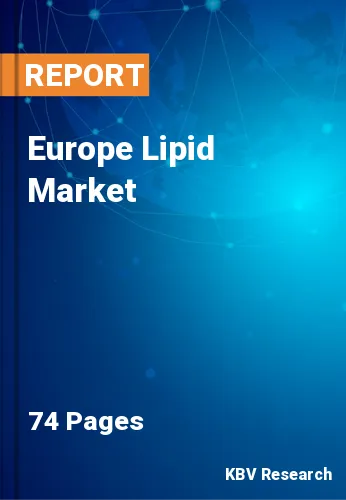The Europe Lipid Market would witness market growth of 8.0% CAGR during the forecast period (2022-2028).
Food lipid oxidation is governed by a three-phase chain reaction: initiation, propagation, and termination. Unsaturated lipids (LH) produce carbon-centered alkyl radicals (L•) in the presence of initiators. The radical created in the initiation stage absorbs hydrogen from other lipid molecules and interacts with it to form hydroperoxides (LOOH) and additional lipid alkyl radicals. Hydroperoxides can decompose into alkoxyde or hydroxyl free radicals, as well as a peroxy free radical, hydroxyl free radical, and water. These processes result in a proliferation capable of catalyzing oxidation reactions via propagation phases, making the reaction autocatalytic.
Heat has a significant effect on lowering the activation energy in endothermic reactions when there are no catalytic agents present. The existence of inorganic and biological catalysts, such as metal ions and enzymes, which are generally present as constituents, encourages this occurrence. Emerging technologies aim to restrict the extent of lipid degradation by avoiding high temperatures over long periods of time, or by inactivating (enzymes) or removing such catalysts (metal ions).
In the European Region, around 60 million individuals have diabetes, accounting for 10.3% of men and 9.6% of women aged 25 and over. Diabetes is becoming more common among people of all ages in Europe, owing to rising rates of overweight and obesity, poor diet, and physical inactivity. Diabetes mortality is expected to treble between 2005 and 2030, according to the WHO. The high rate of diabetes in the region is expected to raise the demand for lipid supplements. Cardioceuticals are dietary supplements that contain all of the essential nutrients, such as vitamins, minerals, omega-3 fatty acids, and other antioxidants like a-lipoic acid and coenzyme Q10, in the proper proportions to provide all-around protection for the heart by lowering the most common risks associated with cardiovascular diseases, such as high levels of low-density lipoprotein cholesterol and triglycerides, as well as factors that contribute to blood coagulation.
The Germany market dominated the Europe Lipid Market by Country in 2021, and would continue to be a dominant market till 2028; thereby, achieving a market value of $794.8 Million by 2028. The UK market is experiencing a CAGR of 7.1% during (2022 - 2028). Additionally, The France market would witness a CAGR of 8.8% during (2022 - 2028).
Based on Application, the market is segmented into Food & Beverages, Pharmaceuticals, Nutrition & Supplements, and Others. Based on Source, the market is segmented into Plant-based and Animal-based. Based on countries, the market is segmented into Germany, UK, France, Russia, Spain, Italy, and Rest of Europe.
Free Valuable Insights: The Global Lipid Market Size will Hit $12.8 Billion by 2028, at a CAGR of 8.3%
The market research report covers the analysis of key stake holders of the market. Key companies profiled in the report include Archer Daniels Midland Company, BASF SE, Koninklijke DSM N.V., Reckitt Benckiser Group PLC, Kerry Group PLC, Clover Corporation Limited, Croda International PLC, FMC Corporation, Cargill Corporation, and Nordic Naturals, Inc.
By Application
By Source
By Country
Our team of dedicated experts can provide you with attractive expansion opportunities for your business.

